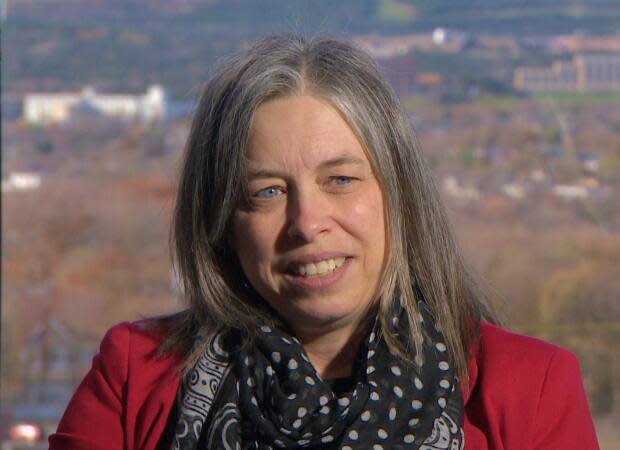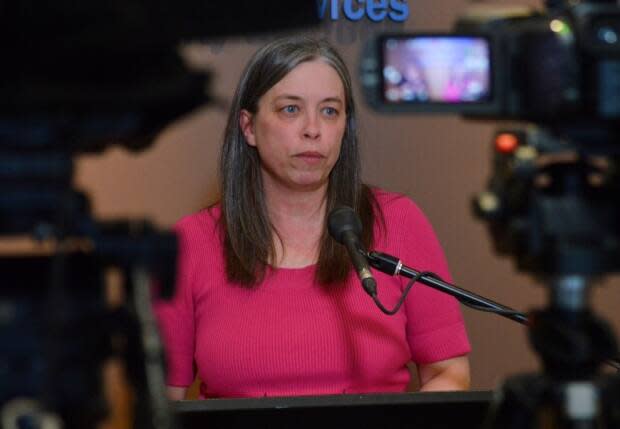Dr. Janice Fitzgerald weighs in on vaccine preparations, a 2nd wave and post-Christmas COVID-19 cases

The COVID-19 pandemic pushes on — 250 or so days since the public left behind a former normal and settled into what has become new daily life routines.
On Friday, Newfoundland and Labrador's Chief Medical Officer of Health Dr. Janice Fitzgerald spoke with CBC News one-on-one, her first such interview on camera since before the pandemic began.
Recent reports of a possible vaccination have left many people hopeful that the worst is behind them. Fitzgerald, too, said she's hopeful that successful trials will continue, adding it's still likely only preliminary information.
But, that hasn't stopped the province from preparing, she said, noting conversations are currently ongoing as to how to best deploy a vaccine in Newfoundland and Labrador when the time comes.
"We've been planning for a vaccine for quite some time, knowing really the only way through this is with a vaccine," said Fitzgerald.
"Now, as things are getting closer, we're having more discussions with our federal, provincial and territorial partners to make sure we can move forward, not just individually as jurisdictions, but also as a country."
The Pfizer and BioNTech vaccine for example, one of several vaccinations the government of Canada has preordered, needs to have a shelf life of two weeks minimum in a fridge and also a minimum of six to 12 months at -70 C as recommended by the World Health Organization. In the long-term, the WHO said vaccines should be able to be stored at -20 C.
When asked how that will shake out for rural Newfoundland and Labrador communities, that may not have that particular infrastructure already in place, Fitzgerald said there are logistics that still need to be worked through, in particular "priority groups," such as those who are at a higher risk for disease and those who are living in congregate living situations.

Fitzgerald said making rotational workers a priority for the vaccine — a contributing factor to the province's slow but steady increase in new cases over recent months — is something the province is considering, but there are no decisions being made yet.
"We have to consider the best way to do that, and the other thing is because the vaccine is going to be coming in in allotments, we're not going to have 520,000 doses of vaccine right off the bat, we have priority groups we have to do," she said.
"Those are all the logistical things we have to work through and decide where the vaccine is going to go, and the best places for it to go, and how it gets delivered there. Those conversations are going on as we speak."
Post-Christmas cases a worry
For now, Fitzgerald is looking ahead to Christmas. With the province's travel restrictions remaining in place for the holiday season, some may look to leave Newfoundland and Labrador to be with their family members in other parts of the country who can't make the trip home.
During Thursday's live COVID-19 briefing Fitzgerald advised against travelling outside of the province if it's for non-essential reasons. On Friday she said she's concerned about the weeks after the holiday season with residents returning to the province and a possible influx of new COVID-19 cases.
"Certainly we're concerned about that. I think everybody is a bit worried about that here in Atlantic Canada, that post-Christmas that's when we're going to see an increased number of cases, perhaps some of these clusters of cases from gatherings that people may have over Christmas, or if they go away and attend gatherings over Christmas," she said.
"We're all really, I think, anxious about those first couple of weeks after Christmas for sure."

Fitzgerald said the province felt it was not the right time to make a change to its travel restrictions, which have been in place since May, with the way things were looking in terms of COVID-19 cases in other places across the country. However, Fitzgerald added, the province will take a look at its travel restrictions again going forward.
"It's obviously something that we've been considering for a quite a number of weeks actually," she said. "I think it's something that most of us wanted to happen, but it didn't make sense with what was happening across the country right now."
As for Newfoundland and Labrador's second wave of the virus, Fitzgerald said it's hard to tell if the province will successfully avoid one — as seen in other jurisdictions across Canada — until a vaccination is in place.
"A second wave can happen at any time, and just because they're happening in other places in the rest of the country doesn't mean we can't have one two months down the road," she said.
"There's no timing, per say, that qualifies something as a second wave. So, you can only answer that question in retrospect really. If we keep doing what we're doing, and we keep following the rules then we can avoid one."
Feeling the love
Dr. Janice Fitzgerald has become a household name across the province since the provincial government first began holding live COVID-19 briefings, streamed on YouTube, Facebook and Twitter for thousands who were in lockdown at home at the time. They started as daily updates, with Fitzgerald front and centre to deliver the latest news on how Newfoundland and Labrador was fairing with a new virus that swept the globe and upended daily life for billions of people.
As the situation in this province began to slow down, the briefings became a weekly occurrence, but are still running each week with Fitzgerald at the helm.
Fitzgerald said people now come up to her in public, congratulating and thanking her and the public health team for their efforts in trying to keep Newfoundland and Labrador safe so far. During Halloween, some even dressed as the chief medical officer of health, while local artists have created works in tribute to Fitzgerald throughout the course of the pandemic.
"It's a bit surreal, I think. The joke in our division at work is that when we introduced the public health legislation a little over a year ago some people didn't know the difference between the chief medical officer of health and the chief medical examiner's office, and now this year I'm a Halloween costume," she said with a laugh.
"It is a bit surreal that this happened, but I do like anonymity. It was nice to not be noticed when you walk down the street. But, people have been very kind for the most part."

